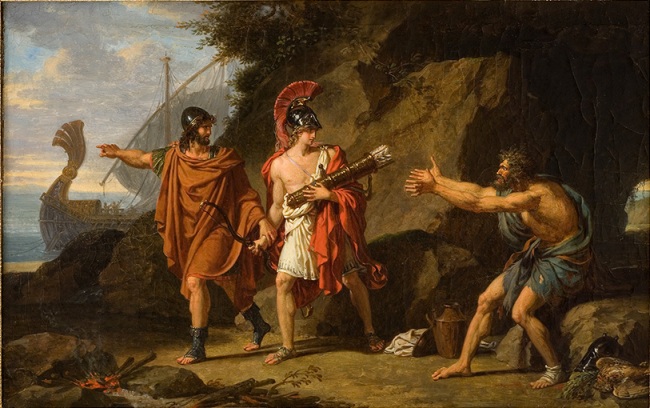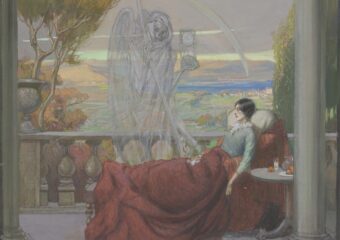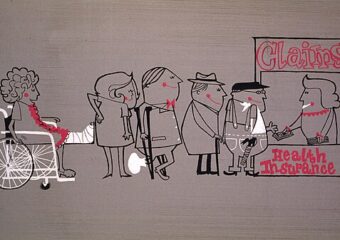The face that launched a thousand ships would determine the fate of Philoctetes (son of Poias), the Greek archer who led seven of those ships. As told in the Sophocles’ play, Philoctetes, during a stay on the island of Lemnos while making their way to fight in the Trojan War, Philoctetes unknowingly wandered too near a shrine to a God. A snake placed there to protect it—“God’s doing”—bit him on his foot. The wound turned fetid and excruciatingly painful. Philoctetes became useless and disruptive, and increasingly difficult for the others to tolerate.
We had no peace with him: at the holy festivals,
we dared not touch the wine and meat; he screamed
and groaned so, and those terrible cries of his
brought ill luck on our celebrations; all
the camp was haunted by him. (p. 195)
On this trip was Odysseus, who decided Philoctetes should be left behind on Lemnos, which is “desolate, no one sets foot on it; there are no houses,” and with his “foot diseased and eaten away with running ulcers.” (p. 195) Ten years later, Odysseus returns with Neoptolemus, the young son of the late Achilles, to gain Philoctetes’ help in defeating the Trojans who the Greeks are still fighting. This is where the play begins and ends. But the practical and recognizable nature of problems Greek tragedies depict, often make them relevant today as a source for perspectives, nay prologues. And this feature of Greek tragedies holds up in this play through the attention it gives to the pain and suffering people can sustain from injuries and illnesses; the abandonment and exile that can accompany illnesses; and the ethics that can involve making decisions when the needs of a few compete with the needs of many.
The Play
After ten years, the war is not going well for the Greeks. Through a captured, Trojan prophet, Odysseus learns that Troy would never be theirs without the aid of Philoctetes and the bow Heracles bequeathed to him. Odysseus must deliver Philoctetes and his bow to the battlefield. As he was the one who marooned Philoctetes on Lemnos, Odysseus takes Neoptolemus as mediator, directing him to “Ensnare / the soul of Philoctetes with your words… / He will not be persuaded; force will fail… / The arrows none will avoid, that carry death.” (pp. 197-199) Because Neoptolemus can’t be expected to reason with Philoctetes, he will have to lie.
Neoptolemus initially resists these demands. “I would prefer even to fail with honor / than win by cheating. (p. 199) Odysseus persists in arguing for the good of the Greeks and eventually convinces Neoptolemus to play along; “I will do it, casting aside all shame.” (p. 200) He tells Philoctetes that he is returning home after learning he would not be afforded his father’s arms that are due him now that his father is dead.
After hearing of Philoctetes’ suffering and grievances, Neoptolemus develops a kinship with him based on the indignities he too has suffered at the hands of Odysseus. He decides he will turn his ships homeward and take Philoctetes with him, and for this, Philoctetes offers Neoptolemus his bow. He hands it over to him in the midst of a vicious pain attack before he falls asleep. Upon awakening, Philoctetes senses a change in Neoptolemus, who then confirms he will instead join Odysseus on a ship to Troy. Philoctetes tells Odysseus he’d rather die, and so Odysseus relents. He is satisfied he has the bow and he and Neoptolemus go to their ships to prepare for leaving Philoctetes alone again.
But, Neoptolemus has had a change of heart.
A kind of compassion,
a terrible compassion, has come upon me
for him. I have felt for him all the time. (p. 233)
And as he and Odysseus are heading back to Philoctectes, Neoptolemus informs Odysseus of his plans to “undo the wrong [he] has done,” return the bow to Philoctetes, and not travel to Troy. Odysseus’ attempts to prevent both fail and he leaves. (p. 242)
Neoptolemus returns the bow to Philoctetes, and tries again to persuade him that he should go to Troy, reminding him of what the prophet had said.
Now since you know this, yield and be gracious.
It is a glorious heightening of gain.
First, to come into hands that can heal you,
and then be judged pre-eminent among the Greeks,
winning the heights renown among them, taking
Troy that has cost infinity of tears. (p. 249)
Philoctetes holds firm, he’s not going, and insists Neoptolemus “take me home as you promised.” (p. 249) Neoptolemus yields, and as they “kiss the ground farewell,” Heracles, a demigod since his death, and in the form of a deus ex machina, appears before them for a final adjudication. “Not yet, not until you have heard / my words, son of Poias.” (p. 252) He tells Philoctetes,
Go with this man to Troy.
First, you shall find there the cure of your cruel sickness...
Troy you shall take.
You shall win the prize of valor from the army,
and shall send the spoils to your home,
to your father Poias.
He the reminds Neoptolemus that he and Philoctetes can’t take Troy without the other, to which Philoctetes responds “I shall not disobey” and Neoptolemus, “Nor I.” (p. 253) They go.
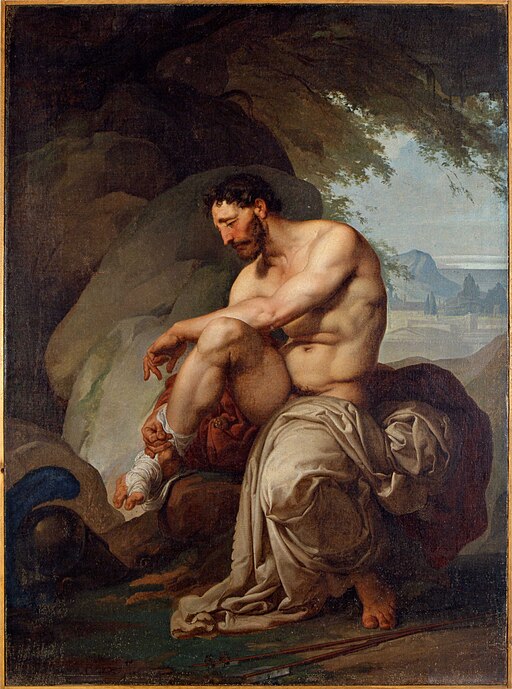
Francesco Hayez (1818-1820)
Public domain, via Wikimedia Commons
Prologues
Over the course of nearly twenty-five-hundred years, the Greek tragedies have been mined for insights into the human condition of a given time. The insights sought have covered the many facets of human experience. Among them have been health, illness, death, and grief. As this blog concerns what the arts bring in knowledge and perspectives from the humanities to the biosciences, Greek tragedies are a viable source, and in particular, Sophocles’ play Philoctetes. Here, I focus on its insights into pain, exile, abandonment, and ethics that carry through today.
Sophocles lived from around 496 BC to 405 BC. He wrote Philoctetes during Peloponnesian War (431–404 BC). It was first performed in 409 BC when Sophocles was in his late eighties.
Pain. The chronic wound and how it affected Philoctetes is the center of the play. Over the ten years Philoctetes is on Lemnos, the wound causes excruciating pain, inflammation, suppuration, and the smells of putrification. Today, this could be the description of wounds in the lower extremities associated with diabetic, neuropathic, vascular, dermatologic, and traumatic causes. A biomedical description of this scenario from a consensus paper on wound management characterizes the situation as follows:
Chronic wounds create major problems for patients. They are painful and tender. Wounds often drain and emit odors, and applied dressings are often conspicuous. Unprotected by an intact skin envelope, these wounds can be retraumatized and progress in size. They may develop an infection leading to sepsis and amputation.
p. 157
While accurate in its listing of the clinical manifestations of chronic wounds that resemble the wound Philoctetes suffers, its lifeless prose fails to convey the agony and suffering these wounds cause many people. Sophocles presents a more vivid and horrifying depiction of painful chronic wounds through the Chorus.
He was lame, so no one came near him.
He suffered, and there were no neighbors for his sorrow
with whom his cries would find answer,
with whom he could lament the bloody plague
that ate him up.
No one who would gather
fallen leaves from the ground
to quiet the raging, bleeding sore,
running, in his maggot rotten foot.
Here and there he crawled
writhing always—
suffering like a child
without the nurse he loves—
to what source of ease he could find
when the heart-devouring suffering gave over. (p. 222)
That’s pain, bodily pain, soul crushing pain, and a familiar situation in contemporary health care. Wounds that cause excruciating pain, alarming sights, and frightful odors can push people away, even those who have professional obligations or filial motivations to provide care and succor. Exacerbating the challenge is the futility often involved in providing relief. Sophocles accounts for the consequences of unrelenting pain and suffering in previewing what is currently considered “assisted suicide” when Philoctetes asks the Chorus for “A sword, if you have got one, / or an ax or some weapon—give it me!” And when asked what he would do with it, he says, “head and foot, all of me, I would cut with my own hand. / My mind is set on death, on death, I tell you. (p. 242)
Abandonment and exile. Philoctetes’ wails from pain and pleas for help, along with the smells and sights of his festering wound, left Odysseus with the only choice he believed he had, which was abandoning him on the island—he had a war to win. As Philoctetes tells Neoptolemus when they first meet, that once oriented, he saw how the ships he commanded were “gone, / all gone, and not a man left on the island.” (p. 206) From then on, he continued, “In all I saw before me nothing but pain; / but of that a great abundance, boy.” (p. 206) Where he is abandoned, Lemnos, he is in exile.
No sailor by this choice comes near it.
There is not anchorage, nor anywhere
that one can land, sell goods, be entertained.
Sensible men make no voyages here. (pp. 206-207)
And, in effect, he is made an inhabitant of another place separated from people free of illnesses—one “who must live henceforth alone from all the world, / must live here and die here. (p. 239)
People with various illnesses are abandoned for different reasons, such as when clinical problems are difficult to solve, health care services are not available, health care is unaffordable, or stigma is involved. Think about, for example, leprosy, TB, AIDs, and schizophrenia, and how the sufferers of these diseases were sent into exile at designated locations away from family and society. More recently with Covid, people were exiled in their own homes and separated from family and friends with dire consequences. But, even when people with illnesses are not abandoned explicitly, illness itself can create a sense of exile for them; like as for Philoctetes they are separated from the world they were in before. More recent writers have built on this idea. In Virginia Woolf’s mind,2 for people with illnesses, “the world has changed its shape…the whole landscape of life lies remote and fair, like the shore seen from a ship far out at sea.” (Woolf, p. 8) As Susan Sontag3 configured the problem:
Illness is the night-side of life, a more onerous citizenship. Everyone who is born holds dual citizenship in the kingdom of the well and in the kingdom of the sick. Although we all prefer to use only the good passport, sooner or later each of us is obliged, at least for a spell, to identify ourselves as citizens of that other place.
(Sontag, p. 3)
In both formulations, illness takes people outside of mainstream society, and thus, as Woolf puts it, “[they] “cease to be soldiers in the army of the upright; [they] become deserters.” (Woolf, p. 12)
Ethics. Odysseus’ decision to abandon Philoctetes on Lemnos and to convince Neoptolemus into deceiving Philoctetes for the purpose of acquiring his bow and service seem unethical prima facie. However, Odysseus is working off the prophet who had told him that, “If this man’s bow shall not be taken by us, you cannot sack the town of Troy.” (p. 198) He must sacrifice a moral imperative of helping Philoctetes for the moral imperative of helping the Greek population and its warriors. It’s uncomfortable, but as he tells a reticent Neoptolemus, lying is not “vile” if it “brings our rescue with it.” (p. 199) The priority he gives to the Greeks over Philoctetes also responds to commands: “Odysseus was one man, appointed by many, / by their command he has done this, a service to his friends.” (p. 239) Though in use as far back as ancient Greek times, utilitarianism wasn’t formalized as moral theory until Jeremy Bentham and John Stuart Mill separately conceived it as such in the nineteenth century, making it an instance of a lengthy prologue.
Related to these ethical decisions is the risk for moral injury as it represents the suffering people experience when put into positions where they must take actions belying their personal convictions and beliefs about what is right to do. Neoptolemus is under pressure to coerce Philoctetes into war and into a brother-in-arms relationship with Odysseus who he cannot countenance in any measure for all the suffering he’s caused him. Neoptolemus’ uneasiness with lying on grounds of his own virtue and personal convictions, and his confessions of compassion for Philoctetes’ plight and suffering, show his soul under assault. His decision not to accompany Odysseus and take Philoctetes home is an action that will protect against moral injury. A more immediate example of moral injury was the threat of it to health care professionals during the Covid pandemic when they had to make decisions about who would get access to life-saving treatments in the face of shortages.
Illness, suffering, and grief are a part of the human condition, and the Greek tragedies show how this has always been a feature of human history. Knowing this, some have suggested, could offer a measure of solace and catharsis. Bryan Doerries, a classics scholar, has observed that,
when people see their own private struggles reflected in 2500–year–old stories, something powerful happens. They open up. They quote lines from the plays and relate those lines to harrowing, personal stories.4
And, the plays give some foresight into how these universal predicaments may turn out, the deployment of a deus ex machina notwithstanding. In this way, Greek tragedies can be prologues, as Philoctetes is on pain, abandonment, exile, and ethics in the case of chronic illnesses.
Citations
1. Sophocles, Philoctetes. In The Complete Greek Tragedies, Sophocles II, translated by David Grene. (Chicago: The University of Chicago Press, 1957)
2. Virginia Woolf, On Being Ill (Ashfield, Ma: Paris Press, 2002)
3. Susan Sontag, Illness as Metaphor (New York: Doubleday, 1990)
4. Doerries, B. When People See Their Own Struggles Reflected in Ancient Stories, Something Powerful Happens. Guardian (Opinion, Mental Health), December 26, 2015.
Title painting:
Ulysses and Neoptolemus Taking Hercules’ Arrows from Philoctetes, 1800, François-Xavier Fabre
Public domain, via Wikimedia Commons
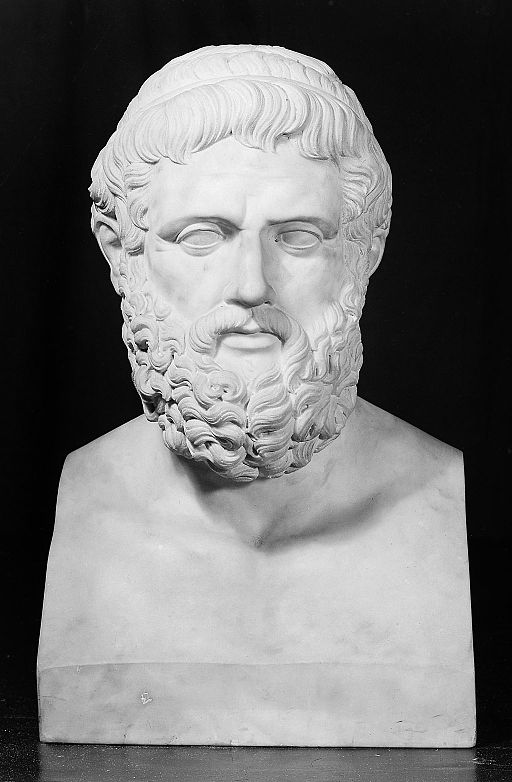
Wellcome, Creative Commons Attribution 4.0 International
